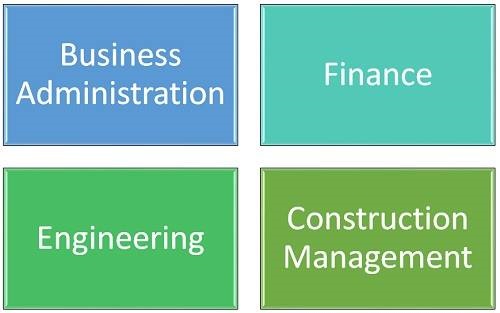What happens when companies misjudge the cost of a project? They may need to scramble to come up with additional funds, change the plan and potentially cut corners or even find themselves unable to complete the project at all. Miscalculations can be disastrous for companies, especially in fields like construction, manufacturing and engineering, in which both budgets and timelines are tight. Accurately predicting the costs of a project is such an important part of business that there’s an entire occupational group – one which accounts for 217,900 jobs in the United States – devoted to this responsibility. Most cost estimators need a bachelor’s degree to work in the field, but the subject of that degree can range from business and finance to engineering and even construction management.
The Cost Estimator Occupation
Jobs for cost estimators tend to be concentrated in specific industries. The specialty trade contractors industry makes up 37 percent of the cost estimator workplace, according to the United States Bureau of Labor Statistics (BLS). Construction of buildings accounts for 18 percent of these jobs. Another 12 percent of cost estimators work in the manufacturing industry. Other top employers include the automotive repair and maintenance industry, which employs seven percent of cost estimators, and the heavy and civil engineering construction industry, which employs five percent.
In these work environments, cost estimators gather, assess and analyze data to determine not only the financial cost of a project but also the labor and materials needed and the timeline to completion, the BLS reported. Cost estimators can’t just guess at these calculations. These business professionals need to fully understand all of the variables that affect the project and how those different variables will impact the final cost and timeline as well as the labor and materials needed throughout the duration of the project. The BLS reports that analytical and math skills needed to understand technical documents and calculate estimated costs are among the most important qualities for this occupation, along with time-management skills, communication skills and attention to detail.
Cost estimators typically specialize in an industry or product in which they have developed expertise. The two largest types of cost estimators are construction cost estimators and manufacturing cost estimators, according to the BLS.
IMAGE SOURCE: Pixabay, public domain
Business and Finance
One possible field of study for aspiring manufacturing cost estimators is business. Studying general business administration, which incorporates coursework in management, accounting, operations and other aspects of running a business, is a strong option for this career, the BLS reported. When candidates have a background in general business, they understand the big picture into which cost estimation job duties fit. Their business studies help them develop analytical and problem-solving skills and to understand the principles of economics, or the study of how resources are used.
Another major aspiring cost estimators might pursue in the field of business is finance. Finance, the study of working with and managing money, is a natural fit for someone who holds the job of predicting and budgeting for costs. Students in a finance degree program devote more of their studies to courses in financial accounting, managerial accounting, financial statement analysis, corporate finance, financial management, investments, financial statements and international finance. Like BBA students, they often complete core business coursework, as well.
Cost estimators can also come to the career field with a background in accounting.
Engineering
For some cost estimator roles, especially in construction cost estimation, you need more industry knowledge than you would gain in a typical business, finance or accounting degree program. Due to the overlap between the technical and business skills needed for this occupation, a degree in engineering is often valuable for cost estimators. Engineering is a very technical field of study in the STEM (science, technology, engineering and mathematics) subject area.
If you struggle in your math and physical science coursework, you might not be a good candidate for an engineering degree program. However, having an engineering foundation is beneficial for cost estimators. Approaching the field from an engineering perspective would give you a thorough understanding of the process of designing, developing and building tools, devices and structures that students with only a business background will not have.
Additionally, engineers must have strong math skills, which are among the skills most essential to success as a cost estimator.
Construction Management
You might not think of construction as being an academic path, but degree programs in construction management exist, and they can be ideal education options for aspiring cost estimators. Community colleges, four-year schools and graduate schools all offer this program of study. Construction management curricula often include courses in building systems and materials, constructor functions, construction accounting and financial accounting analysis, planning and scheduling projects and budgeting and estimating project costs. As with engineering, construction management is a degree program that offers students a deeper understanding of the projects in which cost estimators will play a crucial role.
While a bachelor’s degree may be your main job credential in other occupations, employers of construction cost estimators often look for candidates who have construction work experience as well as a degree, the BLS reported.
Additional Resources
What Kind of Job Can You Get With a Degree in Business Administration?
What Degree Do I Need to Become a Construction Manager?
What Is the Salary Potential for Someone With a Business Degree?




